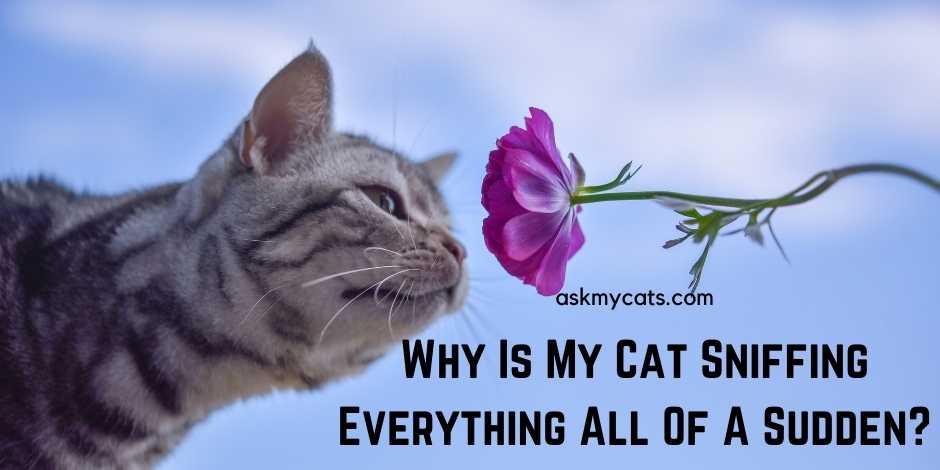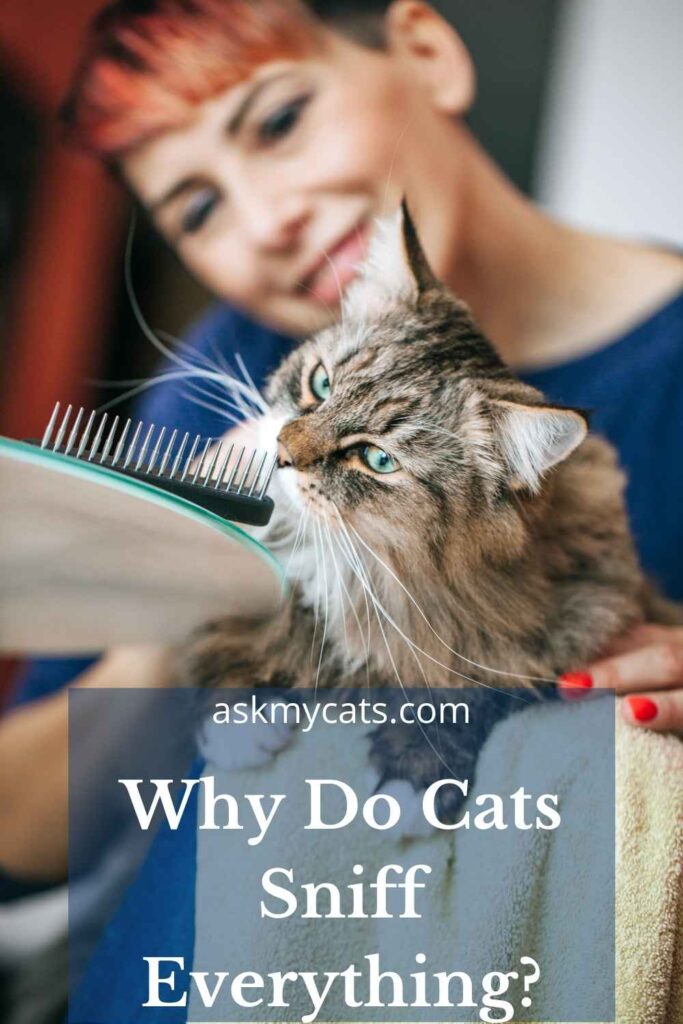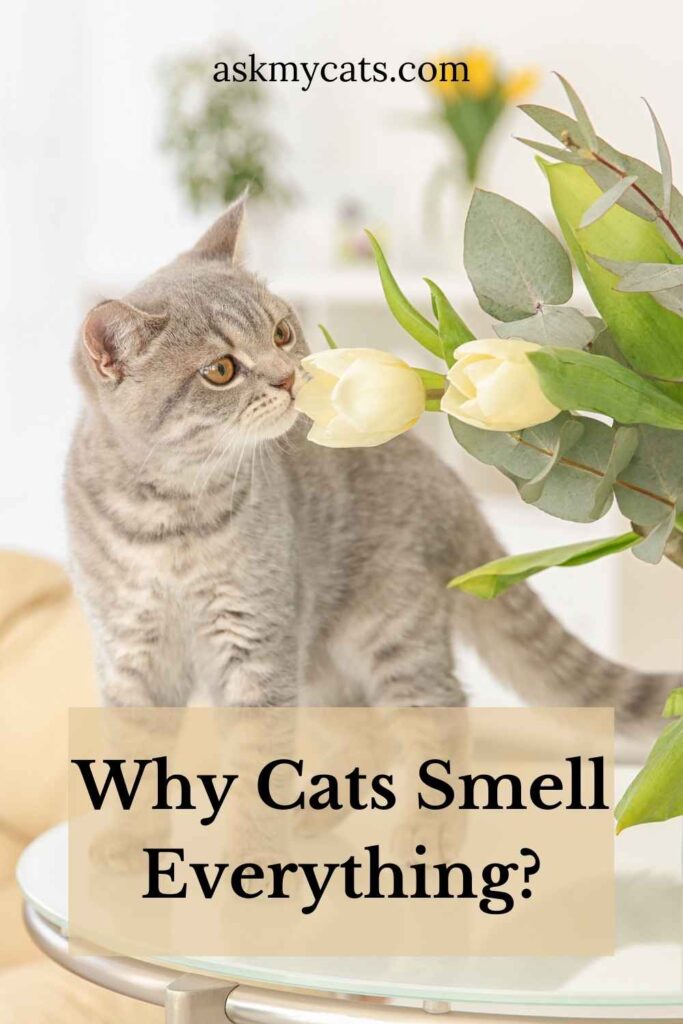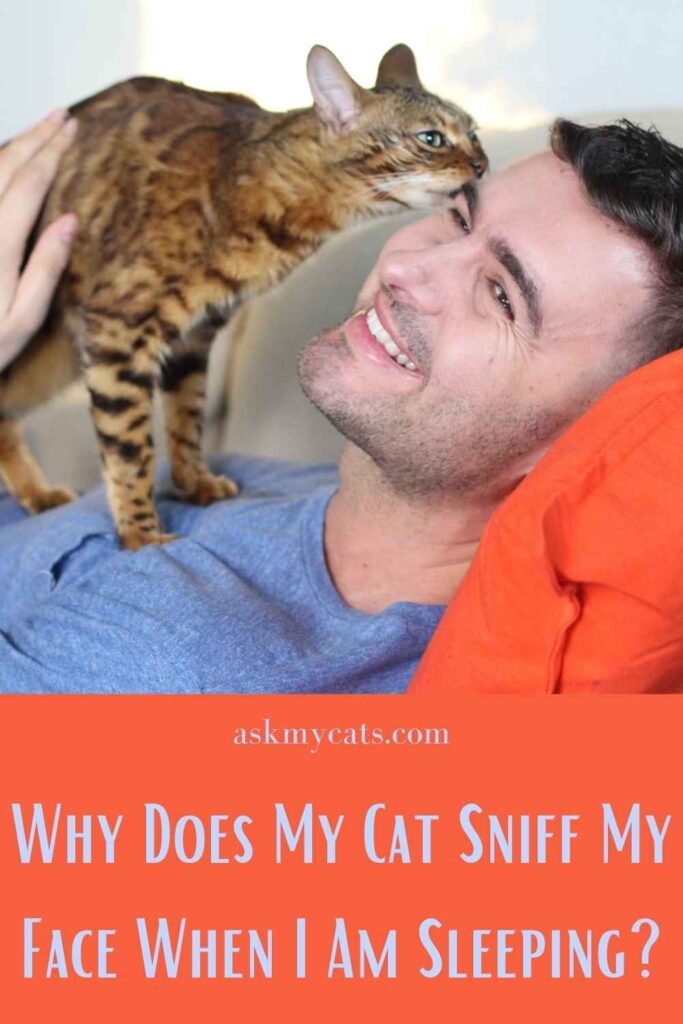A cat’s sense of smell is superior to ours in any way.
Cats use their sense of smell to learn about their surroundings and to search for prey or food. They often sniff other cats’ smell signals to determine if they are friends or foes.
Urination, defecation, rubbing, and scraping are all used by cats to communicate over long distances. Cats will usually say how long ago the message was left by sniffing.
The scent is also significant in the household. By rubbing on furniture, walls, and us humans, cats produce a family smell. It’s the smell of the blended family that makes them feel secure.


Give Your Cat the Perfect Day
Get the Free Ebook!
Why Do Cats Sniff Everything?
Since cats have two “noses,” smell is very valuable to them.
A cat’s normal nose has a smell surface of 20 square centimeters (the respiratory epithelium), relative to our two to four centimeters.
Nerves transmit signals to the olfactory bulb, the brain’s smell field, from this surface. Cats, like humans, sense scents in the air they take in instinctively and by sniffing it intentionally.
This part of their scenting mechanism is anatomically similar to ours, but it is more advanced. Unlike humans, they have an additional smell organ called the vomer nasal organ or Jacobson’s organ.
This is a scent analyzer, which sends signals to the amygdala, a brain region involved in sex, food, and social behavior, as well as the nerves in the nasal cavity.

When a cat uses the vomer nasal gland, the upper portion of the nose wrinkles, the mouth opens, and the upper teeth are visible.
This serves to pull perfume into two small ducts right below the front teeth in their upper mouth. Flehmen’s behavior is the name given to this type of behavior. When cats are smelling pheromones, they do this.
Humans, dogs, and other animals are unable to detect feline pheromones.
Pheromones are produced by glands located at the end of the cat’s spine, up the top of the tail, around the anus, around the urogenital region, on the central pads of the paws, and in the nipple area.
On the lips, under the chin, around the mouth, and on the forehead just behind the ears, where the hair is mostly small, there are scent glands.
So, anytime the cat sniffs, they’re searching for feline messages, rats, or checking to see if the family smell is up to date.
A cat behaving strangely may be sad. Remember how you feel when you were dumped the last time? You lay in bed all day, didn’t get up, and just ate when your mother called and threatened to come over until you shoved some food into your face right now.
A cat that has recently lost a favorite friend, for example, can act in a similar manner. He ignores even snacks and leaves his diet unattended for days.
He tucks himself under the bed. He doesn’t care about grooming because, well, what’s the point? He still sleeps more than the recommended 18 hours a day.
Why Do Cats Smell Everything?
For your pet, the sense of smell is everything.
We used to think that dogs were more scent-oriented than cats, but new evidence shows that cats are almost as scent-oriented as dogs.
Consider your cat’s unique odor as a feline identification badge. The scent is used to associate, engage socially, and mark territories in cats and is used to assess sexual identity.
To bring this into context, the average person’s nose contains between five and twenty million scent-detecting cells. Around 67 million cats exist. (The Bloodhound, the king of scenting dogs, has 300 million followers.)
While humans lack the “equipment” to comprehend cat odors, we will learn to identify and comprehend behaviors triggered by scent.

1. Cats’ Smell and Scratching
Scent glands in the pads of cats’ feet are located near their toes. When they scratch an item, they leave behind not only noticeable traces but also their own smell.
When cats want to show who owns something, they scratch it repeatedly in front of another cat (or dog) they want to please.
And cats that have been declawed go through the motions. Any important real estate, such as near doorways, litter boxes, sleeping quarters, and the like, are prime paw-scented targets.
Clawing is unavoidable since it acts as a form of contact for cats. The easiest way to deal with claws is to have claw training and a legitimate claw target for your new pet so he won’t damage your valuables.
2. Cat Smell and Bunting
Scent glands can be found in a variety of places, including the toes. The skin of the chin, lips, cheeks, forehead, and tail of cats has similar smell glands. Bunting is the act of rubbing one’s head and body against other humans, creatures, and objects.
Bunting transfers the kitten’s trademark odor to whatever he rubs, and this “scent-sharing” helps identify family members and protected items.
When Kitty head-bumps you or rubs your ankles and twines his tail around your neck, it’s a massive compliment. He’s identifying you as a member of his family, a prized piece of his land or property.
According to research, the pheromones released by the cheek glands have a soothing effect on cats. These pheromones, which have been chemically replicated in Feliway goods, mark territories as healthy. The cheek glands also contain a pheromone fraction that marks other cats as mates.
3. Action Communication
The inferior kitty approaching and bumping/rubbing against the more dominant pet or human is considered to be a deliberate indication of deference.
This exposes delicate eyes to teeth and nails, so head bumps and cheek rubs to your face (or another cat’s face) should be regarded as a symbol of friendship and confidence.
Your kitten considers nose touches and hip leans to be signs of affection. After you get home from work, you might find Kitty doing a cheek rub as a greeting action.
Not only is he sniffing your sneakers or bag to “read” where you’ve been, but he’s still buntings to freshen the “family smell” and welcome you home.
This mechanism of exchanging familiar fragrances is thought to include social grooming—that is, cats and kittens grooming each other or even you!
When your kitten tries to brush you, the puppy, or the other cats, you know he finds you to be a real member of the household.
4. Cat Smell and Urine Spray
Urine incorporates more specialized chemicals (pheromones) that tell other cats about the sexual identity of the cat that urinated.
Male and female cats urinate on a flat surface—the litter box—and spill the feces. When a cat needs to mark territories with pee, it adopts a distinct pose.
The spraying cat stands tall, backs up to the goal, keeps the tail straight up with only the tip quivering slightly, and sprays urine backward towards vertical objects such as branches, stones, or your wall or furniture.
When used to mark territorial lines within your home, urine from an intact male cat has an especially strong odor that can be difficult to remove.
The pheromones in the urine signal to other cats that King Tom is in control of this territory, and the spraying serves to suppress the sexual activity of less dominant cats that enter the territory.
Intact females that spray appear to do so to signal their interest in the nearby feline Romeos.
Territorial spraying is significantly reduced during neutering. When altered cats of either sex are insecure, they can revert to spraying and hit-or-miss litter box action.
Kitty’s own familiar, soothing smell can be scattered throughout the room when he’s stressed. Spraying serves as a relief reliever for the distressed cat in these situations.
Interesting Read: Is It Normal For Pet Cats To Chew Corners Of Inedible Things?
Why Is My Cat Sniffing The Floor?
Your cat is actually sniffing the floor because he has found some interesting scent on the ground, which can be from leftover food.
Cats have about 200 million scent receptors, compared to about 400 in humans, so she is actually smelling something that you can’t, and hopefully something that doesn’t leave a scent.
If you have other animals (especially cats) in your home, she may be testing the intensity of the scent left behind to see how long ago another cat went by this place.
If your cat’s behavior is unusually concentrated on one place or seems obsessive, you can investigate either the spot or the pet, but if she’s just pausing to smell the ground for a few moments while she goes through her day, you shouldn’t be concerned.
Why Is My Cat Sniffing The Floor And Rolling Around?
Your Cat is sniffing the floor and rolling around because the smell of the cat can be transmitted by rolling on the floor.
Cats use their scent glands on their cheeks, feet, and flanks to place a personal scent on it so they interact mainly by the way someone or something feels. Both domestic cats and big cats exhibit this behavior.
When your cat rubs its head and cheeks on the cement, it is possible that it is leaving scent markers all over the house and on your feet.
This alerts other cats that you’ve arrived, declared your territory, and have already left your mark (so other cats need to back off). Marking serves as a deterrent against any future adversaries or competitors.
Many cats have an instinctive need to scratch and rub their territories to distinguish their territory. If your cat is marking territory with pee, though, you can teach him to stop.
Why Is My Cat Sniffing The Carpet?
Your cat is obsessed and sniffing your living room carpet is a sign that it stinks and the bad smell attracts the cat.
Your cat may be fascinated with the flavor of a six-month-old crash, whether it’s from food spills, pet injuries, or cleaning supplies.
He or she might be trying to tell you something, particularly if your cat is actually sniffing the carpet (which, a red flag, may lead to severe medical complications).
Pica may signify an underlying health problem or a nutritional deficit.
Why Is My Cat Sniffing Loudly?
Loud sniffing, commonly known as Huffing is a sound made by cats to convey frustration or annoyance.
Huffing is a symptom of annoyance in cats, but it may also be a sign of exhaustion. Cats can even huff after playing or whether they are suffering from an underlying illness.
It’s perfectly natural for your cat to make a huffing noise now and then. This huffing is your cat’s way of sharing their feelings.
They may be attempting to communicate their dissatisfaction or fear of what’s going on. If some cat has entered their personal space or they are tired of being petted, some cats may be very vocal.
Also, check out why does my cat huff
Why Does My Cat Sniff My Face When I Am Sleeping?

Your cat may be sniffing your face to say hello and establish confidence. She could be checking you out or wanting to play with you if she sniffs your face when you’re asleep.
Cats show affection in a variety of ways, so if you have one, be grateful and reciprocate with your love and attention.
- When you’re asleep, your cat could sniff your face for the following reasons:
- She wants to play with you because she is bored
- She is starving and wants you to feed her
- She wants to be near to you
Cats sometimes wake their owners by sniffing their faces, nipping or chewing their noses, and softly pawing or kneading them.
This occurs most often in the early hours when cats are still awake and eager to play or be fed.
Why Does My Cat Sniff And Bite My Hair?
It’s possible that your cat is sniffing your fur because it detects a smell in it that it didn’t see before.
It’s possible you’ve just returned from a hair salon where you have your hair dyed or permed. That may also be a result of the shampoo or hair styling items you’ve been using recently.
Some cats can even sniff and bite your fur as a form of love, stress relief, or simply because they enjoy the taste of your food.
For a more in-depth review, see our previous post on Why does my cat bite my hair.
Frequently Asked Questions
Why does my cat keep sniffing my hand?
Their acute sense of smell enables them to recognize individuals and objects such as potential food and trees, litter boxes and their contents, as well as toxic chemicals, and to assist them in retracing their steps if they become separated from their home. As a result, it is a crucial defensive power.
Why does my cat sniff my bed?
The first is that they are far safer. People toss and switch while sleeping, and if your cat notices you moving around a lot, it can sleep by your bed. They still feel comfortable because they smell your familiar perfume, which they catch a hint of when you’re sleeping.
Final Words
Cats use their sense of smell to learn about their surroundings and to search for prey or food.
They also smell other cats’ scent signals to determine if they are friends or foes. Cats, like humans, sense scents in the air they take in instinctively and by sniffing it intentionally.
If you have any questions, feel free to ask them in the comments section below!

My cat has lymphoma on steroids. Doing fairly well the last three months today he stopped eating. He is walking around smelling, sniffing licking different things. Is that a sign that he may be getting ready to die?
Dear Donna Hodges,
I know how heart-wrenching it must be for you to see your feline in such a situation, I advise you to make an appointment with your cat vet on an urgent basis as your cat has stopped eating which you mentioned.
While I want to clear this out for you that sniffing is a way by which cats acclimate to the new additions of the environment, it is quite possible its a sign which indicates your cat has lost sense of smelling which makes it do so.
Whatever the situation, make it customary to visit the vet once in a while as your feline is in steroids.
It’s not a sign which depicts your cat is is ready to die.
Hello,
Recently I had my house going through some fixing due to a leaking. My cat stayed in the bedroom more time than normal due to that, which was not ideal. After all was done I had a person cleaning my home and unfortunately she used a product with very strong smell of desinfectant. Later at the same day of the cleaning my cat attacked my wife in what seemed out of the blue. However, once I managed to calm my cat down he started to smell everything. It seems the house was no longer his after that strong desinfectant smell. I went to the vet and tried Felipão in the house. This seems to help but often I still see my cat sniffing around like he is not comfortable with his surroundings.
Hello,
Just give your little cat some time to settle down in the new environment.
I am sure she will calm down soon.
Happy Cat Parenting.